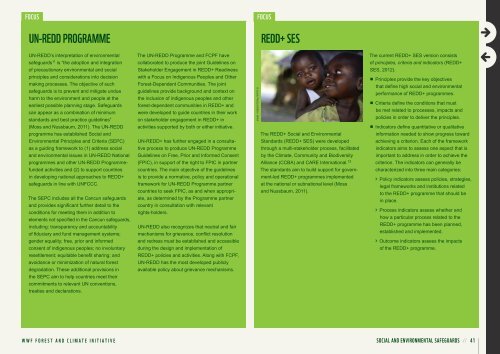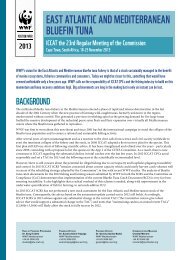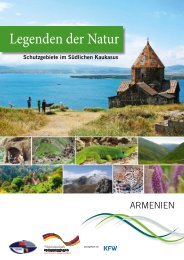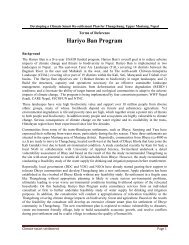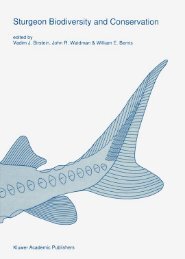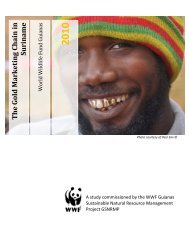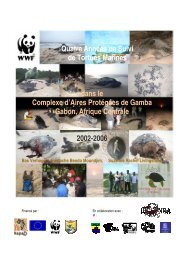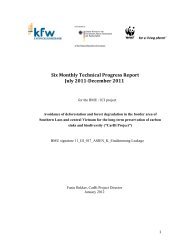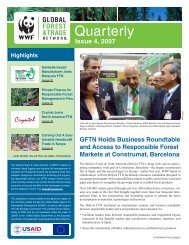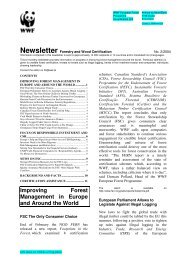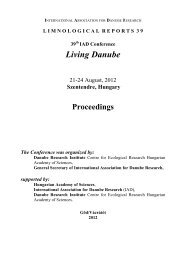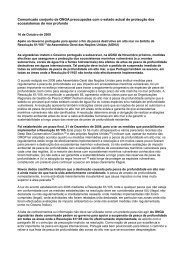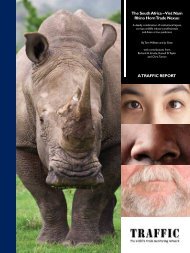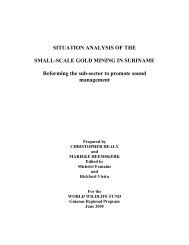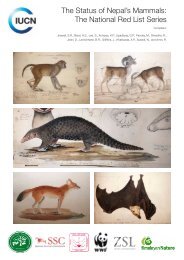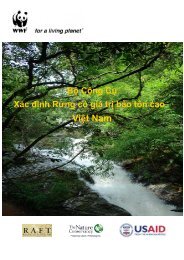WWF Guide to Building REDD+ Strategies
WWF Guide to Building REDD+ Strategies
WWF Guide to Building REDD+ Strategies
You also want an ePaper? Increase the reach of your titles
YUMPU automatically turns print PDFs into web optimized ePapers that Google loves.
FoCuS FoCuS<br />
un-Redd PRoGRamme<br />
UN-REDD’s interpretation of environmental<br />
safeguards 11 is “the adoption and integration<br />
of precautionary environmental and social<br />
principles and considerations in<strong>to</strong> decision<br />
making processes. The objective of such<br />
safeguards is <strong>to</strong> prevent and mitigate undue<br />
harm <strong>to</strong> the environment and people at the<br />
earliest possible planning stage. Safeguards<br />
can appear as a combination of minimum<br />
standards and best practice guidelines”<br />
(Moss and Nussbaum, 2011). The UN-REDD<br />
programme has established Social and<br />
Environmental Principles and Criteria (SEPC)<br />
as a guiding framework <strong>to</strong> (1) address social<br />
and environmental issues in UN-REDD National<br />
programmes and other UN-REDD Programmefunded<br />
activities and (2) <strong>to</strong> support countries<br />
in developing national approaches <strong>to</strong> <strong>REDD+</strong><br />
safeguards in line with UNFCCC.<br />
The SEPC includes all the Cancun safeguards<br />
and provides significant further detail <strong>to</strong> the<br />
conditions for meeting them in addition <strong>to</strong><br />
elements not specified in the Cancun safeguards,<br />
including: transparency and accountability<br />
of fiduciary and fund management systems;<br />
gender equality; free, prior and informed<br />
consent of indigenous peoples; no involuntary<br />
resettlement; equitable benefit sharing; and<br />
avoidance or minimization of natural forest<br />
degradation. These additional provisions in<br />
the SEPC aim <strong>to</strong> help countries meet their<br />
commitments <strong>to</strong> relevant UN conventions,<br />
treaties and declarations.<br />
The UN-REDD Programme and FCPF have<br />
collaborated <strong>to</strong> produce the joint <strong>Guide</strong>lines on<br />
Stakeholder Engagement in <strong>REDD+</strong> Readiness<br />
with a Focus on Indigenous Peoples and Other<br />
Forest-Dependent Communities. The joint<br />
guidelines provide background and context on<br />
the inclusion of indigenous peoples and other<br />
forest-dependent communities in <strong>REDD+</strong> and<br />
were developed <strong>to</strong> guide countries in their work<br />
on stakeholder engagement in <strong>REDD+</strong> in<br />
activities supported by both or either initiative.<br />
UN-<strong>REDD+</strong> has further engaged in a consultative<br />
process <strong>to</strong> produce UN-REDD Programme<br />
<strong>Guide</strong>lines on Free, Prior and Informed Consent<br />
(FPIC), in support of the right <strong>to</strong> FPIC in partner<br />
countries. The main objective of the guidelines<br />
is <strong>to</strong> provide a normative, policy and operational<br />
framework for UN-REDD Programme partner<br />
countries <strong>to</strong> seek FPIC, as and when appropriate,<br />
as determined by the Programme partner<br />
country in consultation with relevant<br />
rights-holders.<br />
UN-REDD also recognizes that neutral and fair<br />
mechanisms for grievance, conflict resolution<br />
and redress must be established and accessible<br />
during the design and implementation of<br />
<strong>REDD+</strong> policies and activities. Along with FCPF,<br />
UN-REDD has the most developed publicly<br />
available policy about grievance mechanisms.<br />
© JULIE PUDLOWSKI / <strong>WWF</strong><br />
Redd+ SeS<br />
The <strong>REDD+</strong> Social and Environmental<br />
Standards (<strong>REDD+</strong> SES) were developed<br />
through a multi-stakeholder process, facilitated<br />
by the Climate, Community and Biodiversity<br />
Alliance (CCBA) and CARE International. 12<br />
The standards aim <strong>to</strong> build support for government-led<br />
<strong>REDD+</strong> programmes implemented<br />
at the national or subnational level (Moss<br />
and Nussbaum, 2011).<br />
The current <strong>REDD+</strong> SES version consists<br />
of principles, criteria and indica<strong>to</strong>rs (<strong>REDD+</strong><br />
SES, 2012).<br />
n Principles provide the key objectives<br />
that define high social and environmental<br />
performance of <strong>REDD+</strong> programmes.<br />
n Criteria define the conditions that must<br />
be met related <strong>to</strong> processes, impacts and<br />
policies in order <strong>to</strong> deliver the principles.<br />
n Indica<strong>to</strong>rs define quantitative or qualitative<br />
information needed <strong>to</strong> show progress <strong>to</strong>ward<br />
achieving a criterion. Each of the framework<br />
indica<strong>to</strong>rs aims <strong>to</strong> assess one aspect that is<br />
important <strong>to</strong> address in order <strong>to</strong> achieve the<br />
criterion. The indica<strong>to</strong>rs can generally be<br />
characterized in<strong>to</strong> three main categories:<br />
› Policy indica<strong>to</strong>rs assess policies, strategies,<br />
legal frameworks and institutions related<br />
<strong>to</strong> the <strong>REDD+</strong> programme that should be<br />
in place.<br />
› Process indica<strong>to</strong>rs assess whether and<br />
how a particular process related <strong>to</strong> the<br />
<strong>REDD+</strong> programme has been planned,<br />
established and implemented.<br />
› Outcome indica<strong>to</strong>rs assess the impacts<br />
of the <strong>REDD+</strong> programme.<br />
<strong>WWF</strong> FOREST AND CLIMATE INITIATIVE SoCial and enviRonmental SaFeGuaRdS // 41


